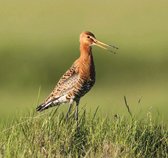Wintering apart, returning together
Birds that fly off to different places in winter can still manage to return home at the same time in spring.
By Emily Sohn
It’s nice to go on vacation, but it’s nice to come home, too. Migrating birds seem to feel the same way. Birds such as black-tailed godwits fly south for the winter. Then, they return home to spend the summer months with their mates.
Now, scientists have found, pairs of godwits often return to their summer breeding grounds within 3 days of each other, even when they spend the winter apart. It’s as if they were somehow cosmically connected.
 |
|
The black-tailed godwit can arrive at its nesting ground in Iceland within a few days of its mate’s arrival, even though pairs don’t winter together.
|
| D. Bergmann |
The discovery came out of a huge survey conducted by researchers from the University of Anglia in England. Before migration season, the researchers put colored leg bands on the birds. Then, they asked birdwatchers around Europe to report by e-mail when and where they saw the birds during the winter.
The simplest way for birds to return at the same time would be to spend the winter together. After all, if they’re in different places, they can’t call each other on the phone and talk about when they’ll meet again.
The survey, however, found that couples usually spent their winters in different places, often in countries as far as 1,000 kilometers apart. One male, for example, spent the winter on the coast of Ireland, and his mate went to the coast of France instead.
These findings are important for conservation reasons, the researchers say. Black-tailed godwits live for up to 25 years. They spend their summers in Iceland, where they mate, but they spread all over Britain, Ireland, and mainland Europe in the wintertime. Once a pair mates, there’s a 90 percent chance that they’ll return to mate with each other again the next year. So, protection of their wide web of habitats is essential.
How do the birds plan their date of return? Until scientists find their feathered cell phones, that question will remain a mystery.







